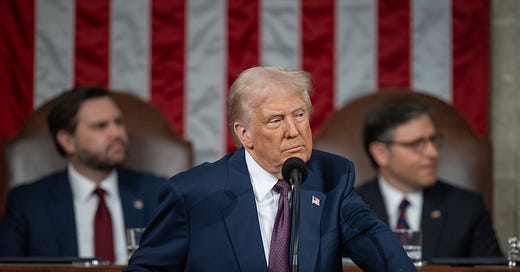I didn’t watch Trump’s address to Congress1. It was a choice. I knew what he was going to say— he’s been saying it over and over and over — and he said it again on Tuesday. And I knew the Democratic response would be mostly feckless, and maybe a bit embarrassing.
I also knew how the press would cover the speech, that they would succumb to old and outdated rules, grant him time and the leeway to speak because of his position, then try to fact check while contextualizing Trump’s speech within the history of other speeches.
And there would be the polling. Fox News reported that several “snap polls” and surveys offered mostly positive public reaction. CNN, which commissioned one of the polls referenced, was less definitive, saying “Republican-heavy audience that tuned in to hear President Donald Trump’s speech on Tuesday greeted it with tempered positivity.”
Good marks from speech-watchers are typical for presidential addresses to Congress, which tend to attract generally friendly audiences that disproportionately hail from presidents’ own parties. In CNN’s speech reaction polls, which have been conducted most years dating back to the Clinton era, audience reactions have always been positive.
This coverage is both depressing and potentially debilitating, because it continues the charade that we are living under a normal presidential administration and encourages us to just continue along as we always have, waiting for the opposition party to do its job and for the mid-terms to sweep away Trump’s Congressional enablers. But that is still 21 months away and a lot of damage will be done in the meantime.
President Donald Trump, after all, is not just a disrupter. He is a usurper. He is a dangerous figure who is seeking to upend how our government is supposed to operate. His use of executive orders, which is not being challenged by Republicans in Congress, is expanding the power of his office in dangerous ways, and his use of threats and bullying is out of the autocrat’s playbook.
“There was nothing new in what he said,” writes Marc Cooper, “he just said more of it, the whole time with his jaw jutted forward as if he had been coached by Mussolini.”
None of this is a surprise. Jeet Heer of The Nation reminded us after the speech that Trump is in permanent campaign mode and not interested in governing. He “categorically rejected the national unity message” that is standard for these speeches and, rather, “offered a long tirade that was in effect a rally, with the GOP members of Congress taking the place of his MAGA fan base and Democrats struggling to find a way to express their outrage.” It was a speech designed to demonstrate power, to marginalize his opponents, and to rile up his base — and, in this way, it was successful.
It was never about policy, though the mainstream press wanted it to be. This is clear when reading the transcript, which is a collection of meaningless words and phrases. This was about performance, as it always is with Trump, and Iv’e seen his performances on TV enough to know what they are about.
Maurizio Valsania, professor of American History at the Università di Torino, writes in The Conversation was full of exaggerated claims, hyperbole, and aggressive boasting. It played on Orientalist tropes (us and them, First and Third World). He raise the fascists’ defense on traditional male power and women’s roles (his attacks on the trans community stem from this). He ginned up anger and hate.
“The extravagant claims appear to match Trump’s view of the presidency,” Valsania writes, “one virtually kinglike in its unilateral power."
Trump’s use of power is not totally without precedent — the second Bush administration argued for unitary executive and Richard Nixon said “when the president does it ... that means that it is not illegal.”
Valsania says this was a dangerous bug built into the system, one that worried John Adams because it “provided for 'a monarchical Republick, or if you will a limited Monarchy.'” Adams, he writes, “was a staunch supporter of the Constitution,” but “he was honest enough to take a hard look over the political layout of the new nation” and admit that there remained “remnants of the British monarchy and traces of a king whose unchecked abuses had led the Colonists to demand their independence in the first place.”
“The Name of President,” Adams couldn’t help concluding in a letter to prominent Massachusetts lawyer William Tudor, “does not alter the Nature of his office nor diminish the Regal Authorities and Powers which appear clearly in the Writing.”
Valsania’s argument is likely to be controversial, because it flies in the face of 250 years of American mythology that tells us that the Constitution is a perfect document, that “the “nation is secured by checks and balances" and that our “institutions … make the nation.”
But the system has never been perfect. Each president has attempted to stretch the boundaries of his power, though most have done so more subtly. Trump is different. Trump has no concern for norms or rules. He is concerned solely with power and is willing to game the system to ensure he — as he told Volodymyr Zelenskyy — “has the cards.”
Trump is neither Hitler nor Mussolini, but like them he gained a seat at the card table legitimately. To use a different metaphor, they entered through the front door and used then used the system against itself. I fear we are witnessing something similar from Trump.
We need to understand this and the press needs to acknowledge this. It cannot continue relying on old ways of doing things. We need to change.
I did read through the transcript and some of the coverage.)





